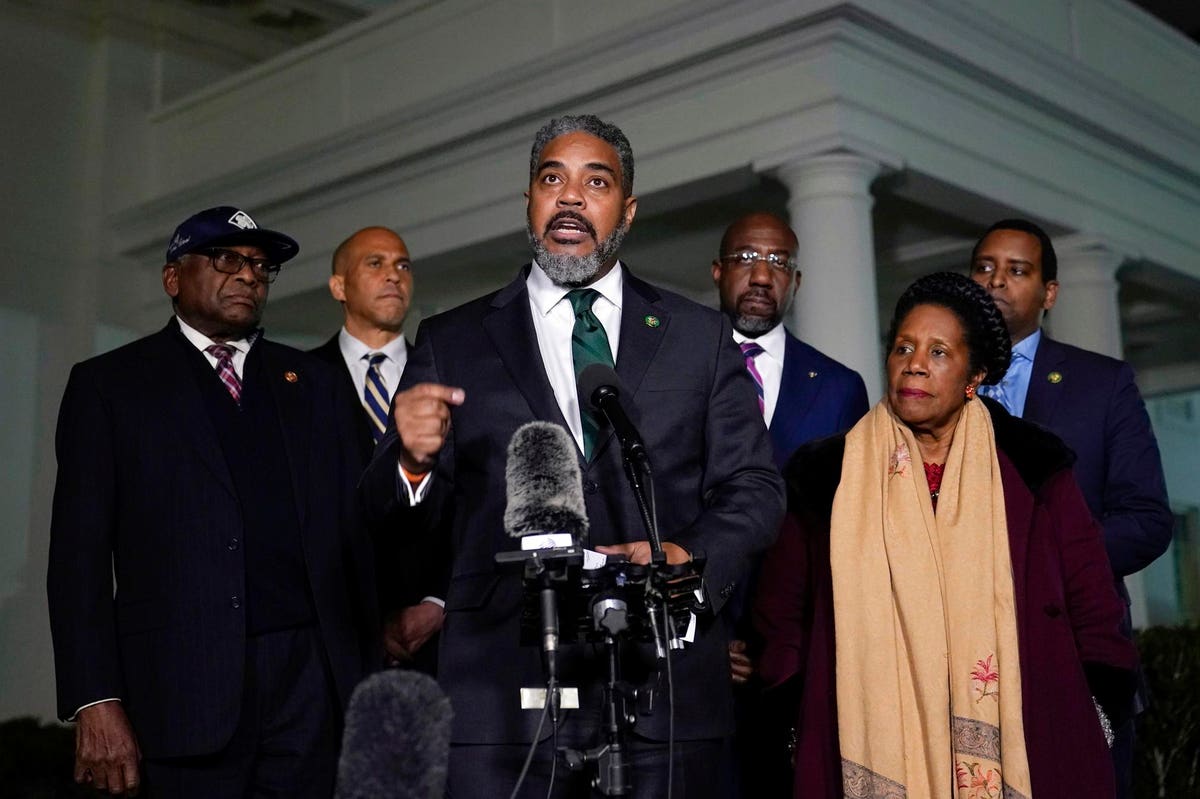It is an early Wednesday morning on Capitol Hill. With just days to go before a long-awaited congressional recess, Congressional Black Caucus (CBC) members are holding a press conference centered on the “recent attacks on Blackness and our fundamental rights.”
In a press room steps away from the U.S. Capitol Visitors Center, CBC members assemble around a podium adorned with the congressional seal. They would later go on to address post-2020 election voting reforms passed in Republican-majority state legislatures, the Supreme Court’s redistricting decisions in favor of Black voters in Alabama and Louisiana, and state-level moves to restrict the teaching of Black history in classrooms.
For CBC Chairman Steven Horsford (D-NV), the press conference allowed he and 57 other CBC members to draw attention to attacks that he describes as ” against Black people and blackness..coming from every side.”
“Black people are under attack in America, but we are not victims, and we are not powerless,” said Rep. Horsford, 50. “In this fight before us, our fundamental rights are under assault and our very history is being denied.”
As 25 percent of the U.S. House Democratic Caucus and two out of 100 members in the U.S. Senate, the CBC has seen its membership rise on Capitol Hill at a time of increased gridlock, partisan fury and an expanded push by the federal judiciary to relinquish more federal powers to the states.
With representation expanding to more than 82 million Americans and 18 million African-Americans nationwide, the CBC’s legislative power in the Republican-majority House has been limited.
Even with these limitations, the CBC has used its voice to influence the Biden administration and speak out against many of the “anti-woke” policies backed by Republican House colleagues and their state and local-level counterparts. The CBC has also leveraged its size and member seniority to advance access to high-quality public education, economic advancement and health equity – all hot-button issues that concern Black American voters, based on recent polls.
Measuring the CBC’s influence requires a clear understanding of what inspired Republicans’ attempt to pass “anti-woke” policies.
Florida Governor Ron DeSantis (R-FL) has called wokeness a form of “cultural Marxism — a term the Southern Poverty Law Center (SPLC) says that members of the far-right coined in the 1970s to misrepresent the push for a more equitable society.
Over the past couple of years, the advancement of the “cultural Marxism” conspiracy theory has led to the passage of legislation that bans a cross-section of Black, Brown and LGBTQIA-authored books, excludes the horrors of enslavement and Jim Crow from American history, and makes it harder for Black, Brown, youth and senior citizens to vote.
This push to be anti-woke also has sparked the creation of more than 400- anti-LGBTQIA bills that are currently moving through state legislatures throughout the country.
During an interview with NBC, DeSantis, who’s currently running for GOP presidential nomination, espoused these efforts, saying that so-called wokeness “has infected institutions, and it has corrupted institutions, so, you’ve got to be willing to fight the woke. [W]e’ve done that in Florida, and we proudly consider ourselves the state where woke goes to die.
Rep. Maxwell Frost (D-FL), the first generation-Z member of Congress, called Gov. DeSantis’ attacks coordinated and well-funded.
“Right now, Florida feels like the epicenter of attacks on Black America because we have a far-right governor trying to erase Black history,” said Rep. Frost, 26. “They aim to change how a generation thinks by changing what we teach them.”
Governors and legislatures in Texas, Alabama, Oklahoma, and South Carolina, among other states, have copied Florida’s controversial Parents Bill of Rights legislation and opened the floodgates for banning of books from literary luminaries that include James Baldwin, Toni Morrison, Audrey Lorde, Maya Angelou, Alice Walker, Anne Frank, Ernest Hemingway and Nikole Hannah-Jones.
These measures have also limited school-based diversity and inclusion programs and high school instruction about gender identity and sexuality.
In February, DeSantis and his appointed Florida State Board of Education banned the College Board’s AP African-American History course. That same board later introduced new African-American history standards that would teach 6-8 graders that some enslaved people benefited from skills they learned while in bondage.
Many people, including CBC member Rep. Sheila Cherfilus-McCormick (D-FL), have vehemently condemned that move.
“Slavery was a brutal institution that had systemic cruelty built into it,” said Rep. Cherfilus-McCormick, 44. “When we look at our history, it’s not that we went through something evil or we’ve never done anything perfect; it is that we have overcome and here stands the CBC – 58 strong.”
With the Supreme Court’s recent decision to upend college affirmative action, the CBC, through the leadership of Rep. Bobby Scott (D-VA), ranking member of the House’s Committee on Education & the Workforce, has worked to push both the U.S Department of Education and the Justice Department to review other elements of college admission inequity such as legacy admission and standardized testing.
“We must look at all types of inequity in the college admissions process and urge the federal government to investigate them and provide remedies,” Scott said during the Wednesday press conference.
With the Senate filibuster and Democrats’ minority status in the House, the passage of meaningful legislation seems almost impossible for the CBC. However, the CBC’s role as the “conscience of the Congress” and its willingness to highlight many pressing issues facing Black America has made it a juggernaut within the Democratic Caucus, the Biden Administration and the push for equity and equal treatment for those living in America.
Following the senseless killing of O’Shae Sibley, a Gay Black man who was attacked while dancing to Beyonce at a Brooklyn gas station, the CBC and its members once again used its voice to bring awareness to the violence faced by those who are Black and LGBTQIA.
With a vast majority of the CBC co-sponsoring the Equality Act– a bill prohibiting discrimination based on sex, sexual orientation, or gender identity in regards to businesses, employment, housing, and federally funded programs–their willingness to advocate for those that live at the intersection seem all but a given.
“No LGBTQ+ person in Brooklyn—or anywhere—should have to fear living in their truth,” Rep. Yvette D. Clarke (D-NY) said in a tweet following Sibley’s brutal killing.
In the eyes of some Republicans, the CBC doesn’t play hardball enough. Shermichael Singleton, former deputy chief of staff for HUD Secretary Ben Carson, while the Caucus represents the interest of Black people, their advocacy could be more vigorous.
“It is clear that the CBC prioritizes the Black people’s interest and has a keen understanding of their marginalized history,” Singleton said. “And that means the CBC needs to define what is an absolute must for Black America and utilize its size as a caucus to hijack the entire process until they get those solutions.”
He continued, “After 60 years of segregation and years of racialized policies, I think Black voters, whether conservative or liberal, don’t have a lot of patience for the niceties and formalities that have come to define the current make-up of the Congress,” he said.
While “wokeness” and the push for more “anti-woke” legislation has led the headlines in Washington and throughout the country, Singleton believes that Black voters are accustomed to anti-Black rhetoric and more concerned with economic interests and educational issues.
While the anti-Black language and legislation might be familiar to Rep. Horsford, he believes that current trends in state legislatures and the federal judiciary are connected to a strategy centered on limiting the Black community’s forward progression.
“We want our children in the next generation to live in an America where they can learn about their history freely, exercise their right to vote, go to college they merit and have access to wealth and opportunity like everyone else in this country,” Horsford said.
“When you lift up Black America, you lift up everybody everywhere,” he added.
Read the full article here





